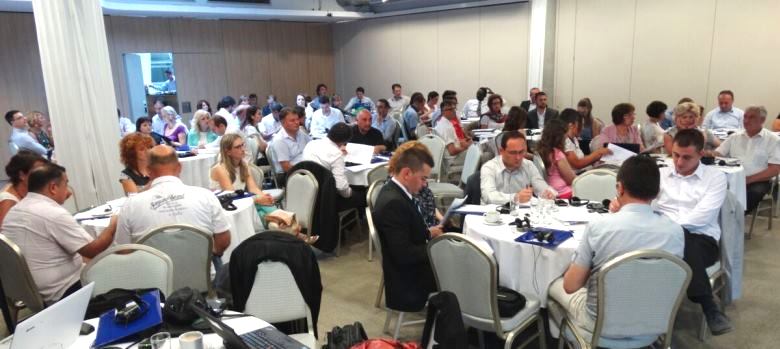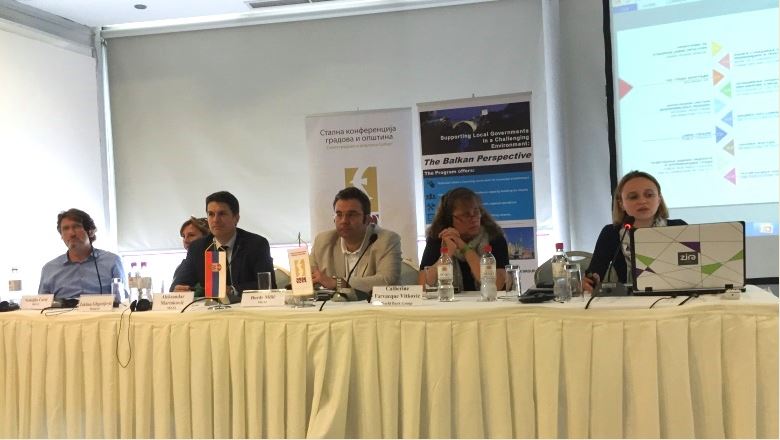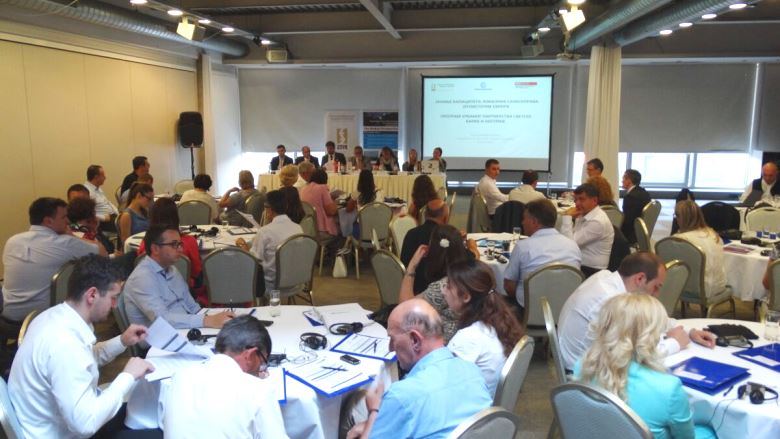The World Bank in collaboration with the Standing Conference of Towns and Municipalities – National Association of Local Authortites in Serbia – organized a Country Dialogue on Strenghtening Capacities of Local Governments. The Dialogue, held on July 6, 2015 in Belgrade, launched the second phase of the World Bank-Austria Urban Partnership Program (UPP II).
The objective of the Country Dialogue was to discuss the current strategic priorities of the respective Ministries of the Government of the Republic of Serbia in the area of municipal development and to facilitate dialogue between the two levels of government on how to move the agenda forward on the topics of municipal finances, investments prioritization, accountability, and disaster risk management. In addition, the meeting provided an opportunity to present the results of the first phase of the Urban Partnership Program and to engage all key stakeholders in the second phase.
The World Bank-Austria Urban Partnership Program (UPP) aims to strengthen the capacity of local governments in SEE region, and to equip local elected officials, city administrators and technical staff with practical tools for decision-making, to effectively manage urban development for inclusive and sustainable growth. While global in scope, this Program is targeted at the Western Balkan countries, including Serbia.
The workshop was attended by some 90 representatives from more than 30 cities and municipalities, including Mayors and Presidents of the municipalities, members of city and municipal councils, heads of finance, planning and construction, as well as municipal administration. The meeting was opened by the State Secretary, Ministry of Public Administration and Local Self Government, Mr. Ivan Bosnjak, Secretary General of the Standing Conference of Towns and Municipalities (SCTM/SKGO), Mr. Djordje Stanicic, Mr. Marko Blagojevic, Director, Flood Affected Areas Assistance and Rehabilitation Office (FAAARO), and representatives of the World Bank.
Mr. Bosnjak emphasized the need for proper planning and management of local capacities. The Government is constantly changing the laws, which makes it difficult for local self-governments to implement. Their capacities vary and, thus “we need to tailor the coat” to enable them to escape the vicious cycle between the many requirements and their limited capacities. Mr. Blagojevic recalled the devastating multiple flooding events of May 2014 that have affected a large area of Serbia and emphasized prevention as a development topic; a new law will be discussed in parliament, which hopefully would be a filter for future action, he said.
The Municipal Finance session featured presentations from Belgrade, Šabac and Subotica that took part in the Municipal Finance Self-Assessment (MFSA). The MFSA helped these municipalities address fiscal challenges, including the need to do more with less, to collect charges and fees for previously subsidized services, and to record and budget for public assets. The following areas were identified as priorities for further development: introduction of financially sustainable capital investment planning; improving control of public procurement and public enterprises in order to rationalize expenditures; introduction of asset management, internal audit, and program budgeting.
Belgrade, Nis and Novi Sad took part in the Land Use and Urban Planning Self-Assessment (UPSA), and Belgrade expressed interest in carrying out an Urban Audit (UA), the first step in identification of a priority investment program. The Urban Audit helps local governments to assess the greatest needs for investments in infrastructure and service provision, and increase transparency and citizen participation in the process of investments programming.
Urban resilience and disaster risk management are key dimensions of sustainable development where local governments play a key role. Ms. Sandra Nedeljkovic, Acting Assistant to the Director, FAAARO, talked about the recently adopted National Disaster Risk Management Program in Serbia while stressing the importance of mapping all the risks, including floods, earthquakes and landslides.
One of the key topics discussed was risk reinsurance for local governments, offered within the framework of the initiative Europa Re as an example of good practice in Sremska Mitrovica. Sremska Mitrovica was the first municipality in Serbia to invest in this type of risk financing by insuring its crops such as maize. Mr. Dusko Saroskovic, Head of Financial Department, said that this was only the first step and that they were planning to expend the insurance to other crops next year.
The second phase of the UPP aims to scale up use of diagnostic tools for local governments and anchor them as part of the municipal practice. At the same time, UPP II aims to expand the citizen engagement and integrity building agenda.
In the next phase, the World Bank through the UPP is expected to play a more prominent role in the support of local governments of Serbia while pursuing continued dialogue with the central government on key reform agenda.


